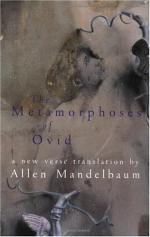|
This section contains 9,853 words (approx. 33 pages at 300 words per page) |

|
SOURCE: McKinley, Kathryn L. “Ovid's Heroines and Feminine Discourse: Metamorphoses 7 and 10.” In Reading the Ovidian Heroine: ”Metamorphoses” Commentaries 1100-1618, pp. 17-42. Leiden: Brill, 2001.
In the following excerpt, McKinley examines how Ovid uses female characters' monologues, and mythological allusions to amplify the ways male character and psychology can be represented in literature.
The voice of the distraught heroine, such as Myrrha or Atalanta, surfaces repeatedly in the Metamorphoses' middle books. Ovid indulges the neoteric taste in the representation of the woman in emotional turmoil and explores her situation in far more depth than that of any other type of female character. The female voice as such in Metamorphoses 6-10 is drawn from the classical traditions of elegy, dramatic monologue, and medical theory. Ovid's extensive treatment of heroines' psychological quandaries did much to legitimize the representation of subjectivity (both for female and, in the Middle Ages, for male character...
|
This section contains 9,853 words (approx. 33 pages at 300 words per page) |

|


